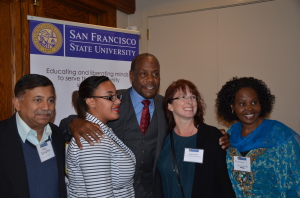
On Sunday, November 8, San Francisco State University celebrated the 46th anniversary of the 1968/1969 Black Student Union and Third World Liberation Front student-led strike, which successfully led to the birth of the field of modern ethnic studies and the first and only College of Ethnic Studies in the United States.
San Francisco native, well-known actor and producer, and long-time activist and humanitarian Danny Glover was the event’s guest speaker.
Glover was a member of the Black Student Union at San Francisco state and played an integral role in the five-month student-led strike that became the longest student walkout in U.S. history.
He began his talk by highlighting the ideas and organizing that made the strike so powerful:
“In September of 1968, my classmates and I, and a diverse coalition of African-American, Asian-American, Latino, First Nation students, progressive whites, and supportive faculty took deliberate action and risk against our collective exclusion and misrepresentation in the San Francisco State University curriculum. We demanded the creation of a College of Ethnic Studies that housed programs of study related to our history and our community … American Indian studies, Asian American studies, Black studies, and La Raza studies. San Francisco State was not the only school with an inadequate curriculum at the time, and we were not the only student activists to organize in hopes of transforming the nature of a public institution. …
We were especially observant that societal relationships were reflections of history, and we were writing our own history of institutional transformation, but inside and outside of this institution, we understood that education had the power to recalibrate our experiences and to engage us in a process of struggle.”
Glover acknowledged not only the successes of the student-led struggle, but also the setbacks in the face of state power. He pointed out that these setbacks along with the failure to transform the educational system into something that addresses the fundamental question of what it is to be both human and a citizen, has led society to where it is today. Glover stated:
“The space and resources of which the College of Ethnic Studies grew is now contracting. New identity-neutral systems of control have emerged to replace the more explicit systems of prejudice that were struck down. The expansion of the penal system and the proliferation of the killings of young Black men and women have become major systems of control. …
Academic support programs for first generation college students, particularly for students of color have been under attack. For-profit colleges have arisen to exploit the failures of traditional higher education to truly practice radical racial inclusiveness.”
During the Q&A section of his presentation, Glover was asked about the Black Lives Matter movement and how young people can make change. He responded in part:
“The idea of breakfast for children, the idea of free education, the idea of free medical care … they don’t start because someone in Congress steps up and says that we need this, they start at the bottom. … How do you think that you got unemployment insurance? How do you think you got Social Security? The people were in the streets fighting for it … each time power tries to erode that in some sort of way, taking it away a little at a time.”
Glover ended his speech with a challenge to the College of Ethnic studies to find a way to engage students in “sustainable activism in the 21st century.” His message of sustained fight-back comes at a crucial time for the student movement. The capitalist economic system and its neo-liberal stranglehold on the poor, working, and oppressed people of the world has chained millions of students to lifetimes of debt and exploitation while a super-minority of billionaires reap all the benefits.
Defying this trend are militant student movements in South Africa and the UK, whose call for free education has already won concessions from the state and/or their universities, while the University of Missouri football team’s recent protest proved how quickly things change when you endanger the profits of the ruling class. The unity and militancy of students and poor and working class communities has the potential to shake the system to its core.





